Dragon*Con Coverage
Sep2
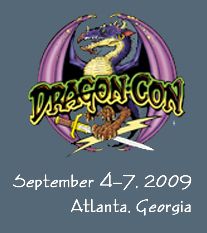
Greetings from hot, humid, Atlanta! I’m thrilled to be able to provide Dragon*Con four-day coverage on behalf of ScriptPhD.com. Dragon*Con is the largest multi-media, popular culture convention focusing on science fiction and fantasy, gaming, comics, literature, art, music, and film in the United States. I will be bringing you my take on the panels and events, with tons of coverage of Battlestar Galactica’s final year of significant presence and panels, but with also incorporating some of Dragon*Con’s science and skeptic panels and other exciting happenings as much as possible. As during ScriptPhD.com’s coverage from Comic-Con there will also be a daily Dragon*Con costume of the day. Full coverage under the “continue reading” jump.
The first thing to know about Dragon*Con is that there is a lot of waiting in line—for panels, for autographs, and even for coffee in the mornings. And also, that lines are a lot more bearable in the mornings after the coffee.
DAY 1
The morning started early today with the first Battlestar Galactica panel, which consisted of Mary McDonell (Laura Roslin), and Michael Hogan (Saul Tigh)—a last minute replacement for Edward James Olmos, who was unable to make it due to a conflict with his filming obligations after being cast in The Green Hornet.
Mary McDonnell opened by saying how exciting it was to see so many people turn out at 10 AM on the first day, because she wasn’t sure, especially considering that this panel was up against the panel with Leonard Nimoy and William Shatner, that there would be many attendees.
While she and Michael Hogan debated whether or not to immediately open with questions, she told a story about Michael Hogan having done stand up at the Polaris convention:
The first question went to Mary McDonnell, regarding how it felt to get married twice, and both times when she was dead. She asked, “Did I get married twice?” and so the audience reminded her that she’d been married in the dream sequence of The Hub. She then described how difficult it was it was to shoot the final scene because Edward James Olmos would start crying and the tears would hit her hand and so her eyes would start fluttering, and she would break character, and they’d have to stop filming.
The next question addressed Mary McDonnell’s biggest regret. She said, that early in the filming she had to find an agreement within herself that Laura was going to take her mistakes to her grave. She then went on to say that she regretted that she hadn’t been able to understand openness was a choice and that she hadn’t been able to find that, and the capacity to love and be loved until the end. And that as far as that went, she was glad that Ronald D. Moore had been able to give her peace.
The next question was whether or not Laura and Bill had ever finished Searider Falcon. Mary McDonnell said the answer depended on what the audience thought they had done off camera. Then, she decided that Edward James Olmos might better be able to answer that question. So, she pulled her bag from under the table, and called him from her cell phone. Unfortunately, it was only after 7 AM in California, so she got his voice mail – and led the entire audience in a chorus of “So Say We All,” as a message.
I asked the next question, which was whether or not the ‘asterisks’ in Laura’s presidency—that is, leader, but dying leader; president, but never elected to the position—were something by which we should judge her position “because of,” or “in spite of.” Mary McDonnell said that she tried not to judge Laura’s presidency at all because it made it too difficult to stay in the role. She went on to go onto what I was really asking, with regard to women in power and said that, in the end, she was grateful for the asterisks because they freed her, and allowed her to grow into a role, and that in her current role [Sharon Raydor in The Closer] she’s a woman without the asterisks, and a real B-I-T-C-H, so that, in a way, the asterisks are a gift.
Both Mary McDonnell and Michael Hogan were then asked about whether they were inspired by real life political leaders. Mary McDonnell said, she was like Hillary Clinton, but that Hillary had better clothes. Michael Hogan, mentioned of course, John McCain. [Speaking of which, remember those sly Tigh/Roslin campaign comparisons during the McCain/Palin run?] Mary McDonnell also mentioned that she was inspired by Judy Dench’s portrayal of Queen Elizabeth.
Another audience member than asked Mary McDonnell what Laura Roslin would do about health care. Ms. McDonnell said that in her opinion she hopes that “Obama states with clarity and initiative what needs to be done,” and that she’s “sure he has a reason for the argument to occur,” but that he “should have anticipated the oppressive element that would then move into control the argument,” and that not having done so was “naive.”
The next question was, again, for Mary McDonnell, and was whether she preferred doing the hard drama like Battlestar or the more comedic things like her time in E/R and High Society. She said that there was really something freeing about the less taxing comedic roles, and that she would enjoy doing that again.
The next question was about the political aspects of the show and the impact they have, but as the questioner was asking, there was a lot of noise from outside. Mary McDonnell took it upon herself to get up, march over, and close the door, to which Michael Hogan said, “We have people who can do that, Mary!”
After that, they returned to the question, and Mary McDonnell said that “I already did health care, you can tackle war and terrorism.”
Michael Hogan said that it was really a privilege to work on a show that has an impact like that of Battlestar and that seeing that Mary McDonnell and Edward James Olmos had signed on had let him know he was getting into something truly special. Mary built on that and said that it’s almost like your talent doesn’t fire up unless you feel like you’re in some kind of conversation and that she’s done some stuff she shouldn’t have [I might agree though I’ll never name them **cough**Replacing Dad**Cough**] and that she really appreciates the “Yeah, that’s why we do this” moments.
When asked about the most meaningful part of the series, Mary McDonnell mentioned that while she hates to watch herself on camera, the one scene she can watch over and over is the one where Laura gives Bill the admiral’s pins and that for her, that’s also the moment where Laura realizes that she loves Bill, and that there was something completely natural in it for both her and Edward James Olmos.
An audience member then asked about Laura and the bald cap, and Mary McDonnell said that she’s very attached to her hair and she’s always been someone who entered the room after the hair announced her so she was initially nervous, but that in the end she found it liberating and she was glad to die a non-glamorous death. And that she was even more gratified to know that people who had lost their hair to cancer were also watching and appreciating what had happened. She found that being bald changes the way a woman behaves and that she immediately felt more fragile, honest, and vulnerable.
The next question was whether Michael Hogan found himself bumping into things with the eye patch. Mary McDonnell answered for him and said that he was very funny and used to order the cast to “talk to my other eye.” He then said, that yes, by the end of the day he was walking into walls.
There was a question about the emotional range of the show, and how they got to that point. Mary McDonnell talked about the scene where she learned her family had been killed in Daybreak and said that she really tried not to think about it ahead of time, because just going into the scene without any preconceived notions gave her the “facility to be fluid.” Michael Hogan said he would pretty much say the same thing, but that a lot of credit also lay with the post-production team and Bear McCreary’s powerful score. Which elicited a round of applause from everyone.
Another audience member asked about parallels between Laura Roslin and other characters that Mary McDonnell has played, and Ms. McDonnell admitted that she doesn’t really remember her characters that well, except for Laura because “we keep talking about her.”
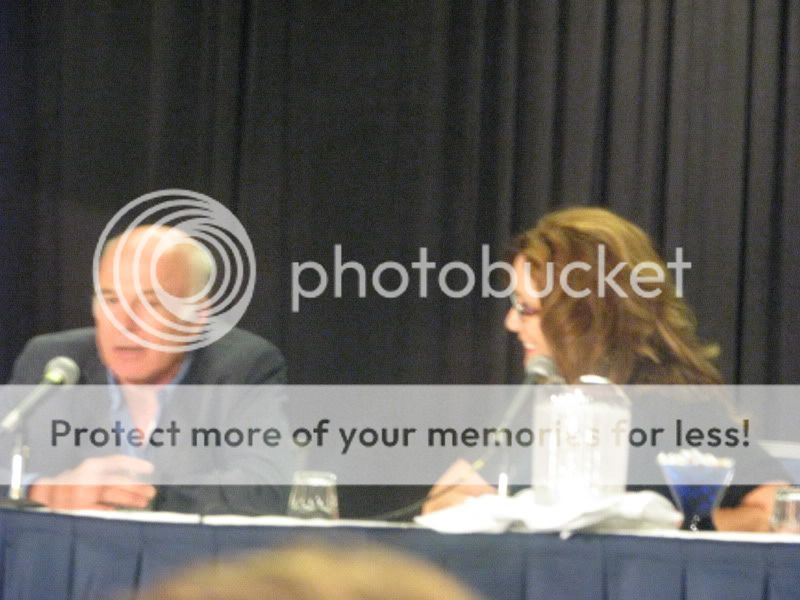
Mary McDonnell and Michael Hogan contemplating audience questions during their panel at Dragon*Con 2009.
There was then a question about the characters’ most heroic moments. Mary McDonnell said she was proud of Laura for trying to steal the election, and that she had to go beyond her own ethical standards. Michael Hogan mentioned the time he spent on New Caprica.
Another audience member asked Mary McDonnell about the flashbacks in Daybreak. Mary McDonnell said she really appreciated them because she got the opportunity to see who this woman was–that she’d lead a solitary life, but that she ultimately liked the way Laura was written. She then mentioned the scene where she’d chosen to go work for Richard Adar, and that the pivotal point came at the moment when she’d been about to sleep with a man 20 years younger [her former student] and realized, “Something’s wrong; okay I’m going to take the job.”
Another question was about Saul’s perspective on Adama and Roslin’s relationship. Michael Hogan said that he was happy for the old man.
The next-to-last question was what Mary thinks the ideal retribution for Baltar would’ve been. She said that “he was tricky,” and that Laura wouldn’t have airlocked him, but something more like a slow poison would have been better. [So say we all!]
The last question was what the “ballsiest thing” either their characters had ever done was, and whether anything carried over into real life. After a reminder from the audience, Mary McDonnell mentioned that for her it was the moment in Blood on the Scales when Laura said, “I’m coming for all of you,” and that it was wonderful to be allowed to “drop everyone one would think one was,” and that should anyone ever threaten her loved ones, she would absolutely respond in the same way.
The panel then concluded and they both thanked us and said they enjoyed being here.
Speaking of health care . . . while waiting in line for the afternoon Battlestar Galactica panel there were representatives from LifeSouth promoting the blood drive, as they’re trying to beat the record set at Comic-Con. It had been a while since I’d given blood, and as I’ve been taking multivitamins lately, I figured I was in good shape. Since there was over an hour wait, the LifeSouth people said it would only take 35 minutes, and I had good friends who offered to save my place in line, I decided to sign up and do some good. While the process was a little longer than 35 minutes, it was truly worth it. I had no ill effects from the experience, got a t-shirt, a snack, and a quiet place to lie down for a bit. I hope that my donation will help them break the record and that more of you will consider blood donation if you qualify. Help save a life!
What could feel better after giving a liter of blood than an afternoon question and answer panel with science adviser Kevin Grazier [ScriptPhD.com interview here], Luciana Carro (Kat), Kate Vernon (Ellen Tigh), Michael Trucco (Sam Anders), Kandyse McClure (Dualla), and Alessandro Juliani (Gaeta)? Twilight you say? That’s tomorrow!
The first question went to Kate Vernon, who was asked about learning that she was the final Cylon. She said that being killed off . . . by her husband [said with a big, dramatic pause] was not a happy day. At that opportune moment, Michael Hogan walked on stage and crashed the panel. She then finished the story by talking about how she had been lobbying Ronald D. Moore for different ways in which to get Ellen’s character back on, and that a few weeks prior he’d called her to say that he’d pitched an idea to the network and should hear back within a week or so. When he called her back he managed to sound really dismal and she thought that it was bad news until he informed her she would be the fifth Cylon.
The next question was for Alessandro Juliani and was whether Gaeta had a call-sign, and if so what it was. Michael Hogan answered, “Stubby;” Alessandro answered, “The back door is open.”
Another audience member asked how it was Kate Vernon had been so upbeat a few years ago at Dragon*Con knowing her character was to be killed. Kate’s answer was simple, “I’m a really good actress,” she then went on to say that she appreciated the fact that on behalf of the audience, “that’s not a secret you want to blow.”
After that an audience member asked “Michael” what it was like to be a love interest for Starbuck. Given that both Michael Trucco and Michael Hogan were on the panel that created a great deal of laughs as the two of them engaged in a mock battle. Michael Trucco ultimately answered that it was great to evolve from what he thought would be just a one-shot on the show.
Kandyse McClure got the next question which centered on Dee going from someone who was “cheerful and capable” to someone who ultimately committed suicide. She said that the dark material permeated her and that the writing ultimately paralleled the journey she as an actress went through on the show, but that she found that Dee’s end was both graceful and necessary.
The next question was for all panelists and centered on what they felt was the biggest reveal of the show. Luciana Carro said that for her, in the episode The Passage learning that Kat had been a drug runner and that her later conversation with Starbuck in which she was told, “You could have been transporting Cylons,” that everything Kat had been through suddenly made sense to her. Alessandro Juliani answered for Kate Vernon, Michael Hogan, Michael Trucco, and himself by saying: “Cylon. Cylon. Cylon. Gay.” Kandyse McClure said that for her it was in the episode Sometimes a Great Notion when Dee was in Helo and Sharon’s family quarters and said it was the first time she got to see the family dynamic and Dee’s personal relationship with others on the ship.
The next question, much to Kate Vernon’s evident delight, was for Michael Hogan and was whether he felt there was a “bromance” between Tigh and the Admiral. Kate Vernon gave the question an immediate thumbs up. Michael Hogan said the question was “too deep” for him, and that “no way I’m answering.” Kate Vernon then took over and said that there was absolutely a bromance and that it’s a big part of the tension in the marriage between Saul and Ellen, because there was no room in the marriage for a third wheel. She felt that she was the third, so that ultimately Saul’s bromance with Adama led her to cheat. To elaborate her point, she performed “Battlestar Fingerpuppets” as her fingers danced across the table to demonstrate how Ellen kept being thrown out due to the closeness between Saul and Adama.
Every panelist was then asked whether they liked how the series ended. Michael Trucco said he was very satisfied. Alessandro Juliani said that “because of his early demise” he saw it without having been a part of the process, but that he found the ending both emotional and satisfying.
When asked whether they kept anything from the set, none of the cast would answer because Propworx (who ran the BSG auctions) was there. However Kandyse McClure mentioned having to ask to have some things removed from auctions when she realized that they had put up some of the family photos that had become Dee’s photos on the set.
At that point, Kate Vernon’s cell phone rang and we all got to say hi to her daughter who was getting ready to get on a plane. Michael Hogan then used the opportunity to also call Edward James Olmos who apologized for not being able to be there, but said that he was chasing the Green Hornet, and that the Admiral would not let us down again.
The moderator than asked Kevin Grazier about his work as a science advisor and what the most interesting advice he gave was. He mentioned having to quickly come up with how an FTL drive works for The Captain’s Hand and also mentioned an idea he’d come up with for a way to destroy a Basestar without firing anything, that later influenced the scene where the Raptor jumped before leaving the bay. It’s worth noting that his book on the science of Battlestar Galactica will be coming out shortly and go into substantially more detail. [He went into these topics in MUCH more depth during his interview with ScriptPhD.com.]
Michael Trucco was asked what it was like to be in the resurrection tub. He said the goo was like warm skim milk . . . warm skim milk with dust, hair, and random crap from the set, and that he’ll never do it again.
Luciana Carro’s answer to the question of the gender reversal in Scar that stemmed from two women competing to be Top Gun while the men stood to the side was a succinct: “Whatever, man; it’s like that in real life.”
The cast then discussed the speculation surrounding the fifth Cylon, and Alessandro said that when he “sang to his stump” he’d really thought it might be him.
A discussion of the “love quadrangle” between Dee, Anders, Lee, and Starbuck then followed. As Kandyse talked about knowing what it’s like to be in love with someone who doesn’t love you, Michael Trucco interrupted with “We were doormats!” Kandyse McClure then joked that she was just waiting for the chance to “make out with Trucco,” and would watch him thinking, “Yeah, Michael’s hot.” They then pretended to make out on stage.
Someone then remarked to Michael Hogan that “Colonel Tigh is one of the most damaged characters on TV. Where did you find him?” Michael Hogan responded that he knew from the beginning that Tigh would have a bit of a drinking problem but that much of the rest of the character was developed in concert with the producers after the miniseries.
A discussion about the use of the guns on the series followed. Alessandro said he’d only been able to run with the gun, never actually shoot it. Michael Trucco said he had squibs and that they burned. Luciana Carro got to fire live rounds, and said that they had real military come on set to show them how to use the weapons accurately. Kandyse revealed that when Dee shot herself that the gun was not loaded but that there was someone just off screen to fire a squib to provide realistic sound.
Alessandro Juliani then had to answer the difficult question, “Felix Gaeta: traitor or hero.” He said that Gaeta was a tragic hero, a terrible judge of character, who does not pick his allies well, but still holds on to his threads of morality.
There was a bit of a discussion about practical jokes on set. Other than Kandyse showing up in a tiara and feather boa, they said there wasn’t much of it – more often they’d get to giggling, and reaffirming something I’d previously heard, that Mary McDonnell was pegged as the worst offender.
When asked what was next for them, the answers were: Alessandro Juliani is Superman’s doctor on Smallville. Kandyse McClure is in several movies [Persons Unknown, a remake of Children of the Corn, and Mother’s Day]. Michael Trucco will be in The Plan, a movie called Meteor Storm on the “SciFi” channel, which he then pronounced SeeFee to go along with the SyFy rebranding, entirely unconvincingly (and perhaps deliberately so) he said, “No, it’s a really great movie; it’s good.” Kate Vernon will be in the new Miley Cyrus movie as well as the new National Lampoon movie. Luciana Caro will also be in a SyFy channel movie, which she said was “not very good, but what do you do—you need the money.” She’ll also be in Caprica as a character unrelated to Kat in any way; Kevin Grazier once again reminded us of the Science of Battlestar Galactica book he has coming out.
A night of people watching followed and the crowds in the bar were truly overwhelming. Michael Hogan and Richard Hatch both took pictures as they descended the escalators, and Gareth David Lloyd of Torchwood was actually talking to people in Who-verse costumes.
Which brings us at first to our thematically appropriate Costume of the Day: New Caprica Laura.
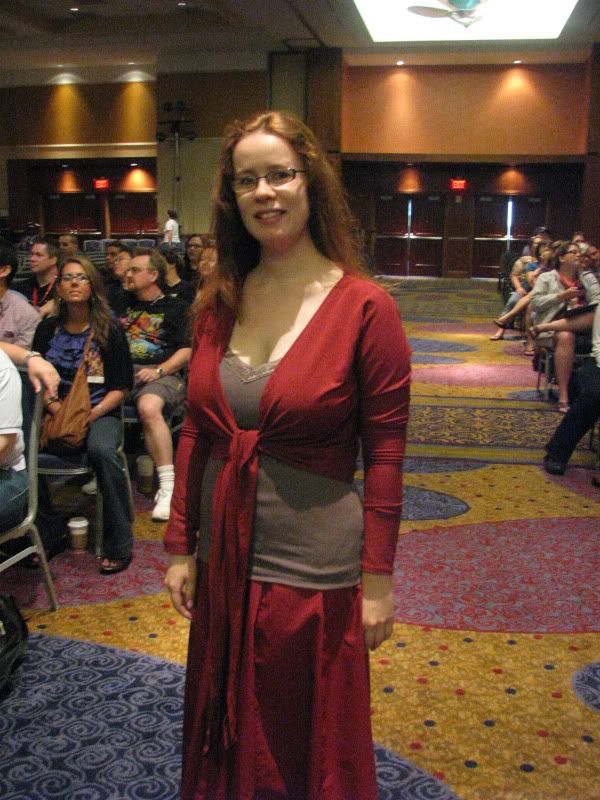
Day 1 Dragon*Con Costume of the Day: New Caprica Laura.
DAY 2
Day 2 of Dragon*Con began with another Battlestar Galactica panel. The participants in today’s panel were Kevin Grazier [BSG’s science advisor], Luciana Carro [Luanne “Kat” Katraine], Kate Vernon [Ellen Tigh], Michael Trucco [Sam Anders], Alessandro Juliani [Felix Gaeta], Michael Hogan [Saul Tigh], and Mary McDonnell [President Laura Roslin].
The moderator began the question and answer session by asking Mary McDonnell how difficult it was to prepare for Daybreak [the series finale]. In response, she recounted the often-told story about Edward James Olmos crying and making it difficult to stay in character.
The first audience question was whether there was a ‘pecking order’ among the cast. Mary McDonnell drolly replied: “That question should’ve been addressed to Mr. Olmos; end of answer.”
Alessandro Juliani was asked whether there was a scene with Gaeta that he wished hadn’t been cut. Juliani answered the question in reverse, by instead saying that he pushed hard to have the final scene between Gaeta and Gaius Baltar added and give an ending to their relationship, so that rather than being disappointed by a missing scene, he was happy to have a scene added.
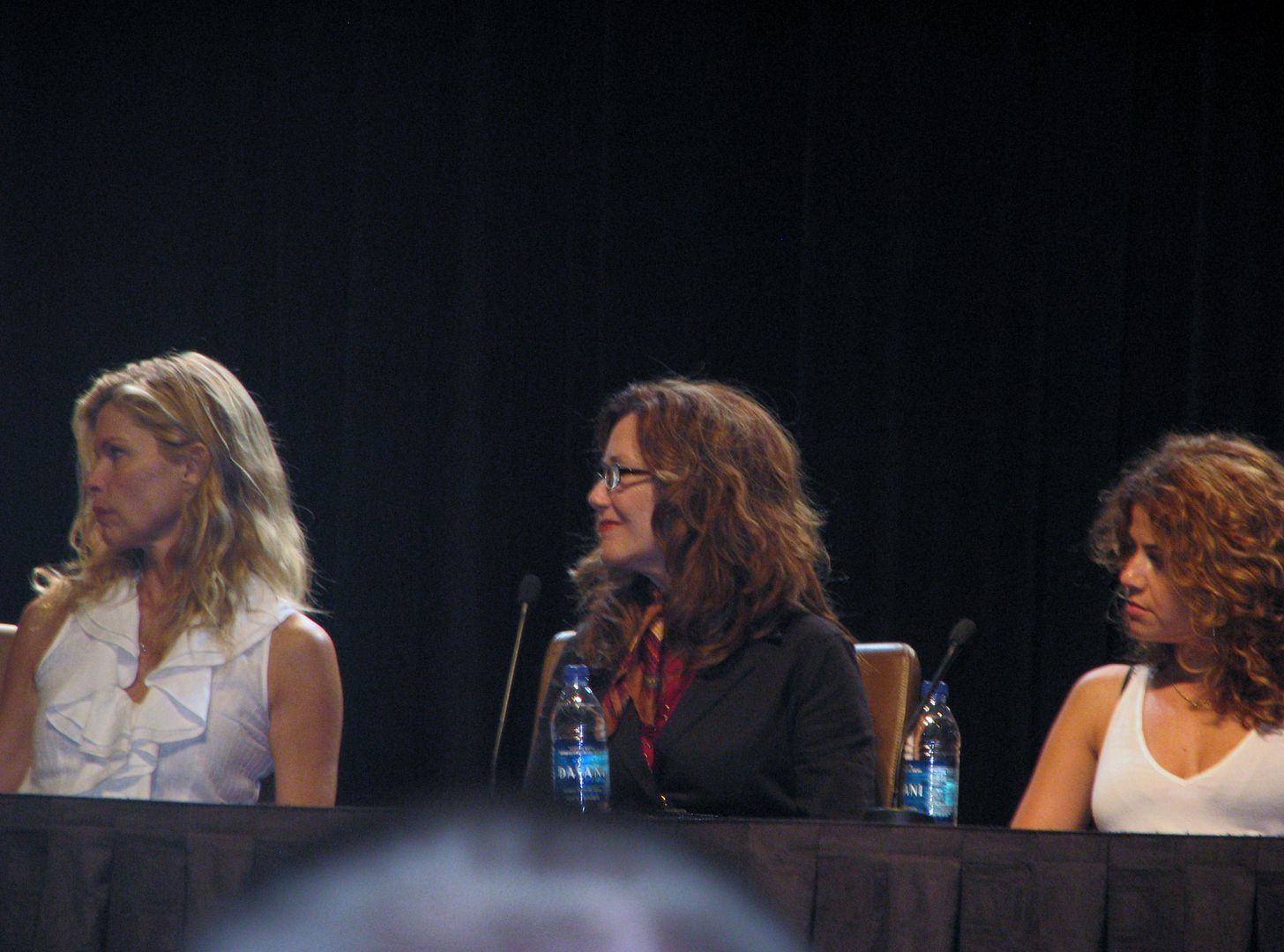
Mary McDonnell and Kate Vernon don't quite believe in the veracity of Michael Hogan's answer about Colonel Tigh and Cylon Model Six.
The moderator asked Michael Hogan to address Tigh’s relationship with Six. Hogan said that he was initially nonplussed about that, but he came to realize that it was the only way for Tigh to learn what it was to be a Cylon because she was the only Cylon there. Mary McDonnell and Kate Vernon shook their heads vehemently and with pretty unmistakable facial expressions made it clear that they didn’t believe him and that it was all about sex.
The next question was addressed to all members of the panel who had been present in the miniseries primer to the television show: How did you find your characters so quickly? Mary McDonnell described the bible that Ronald D. Moore had prepared for the cast. She also gave credit to [series director] Michael Rymer for setting the atmosphere. Michael Hogan agreed with her on this, and said that in many ways it was like working on a major motion picture.
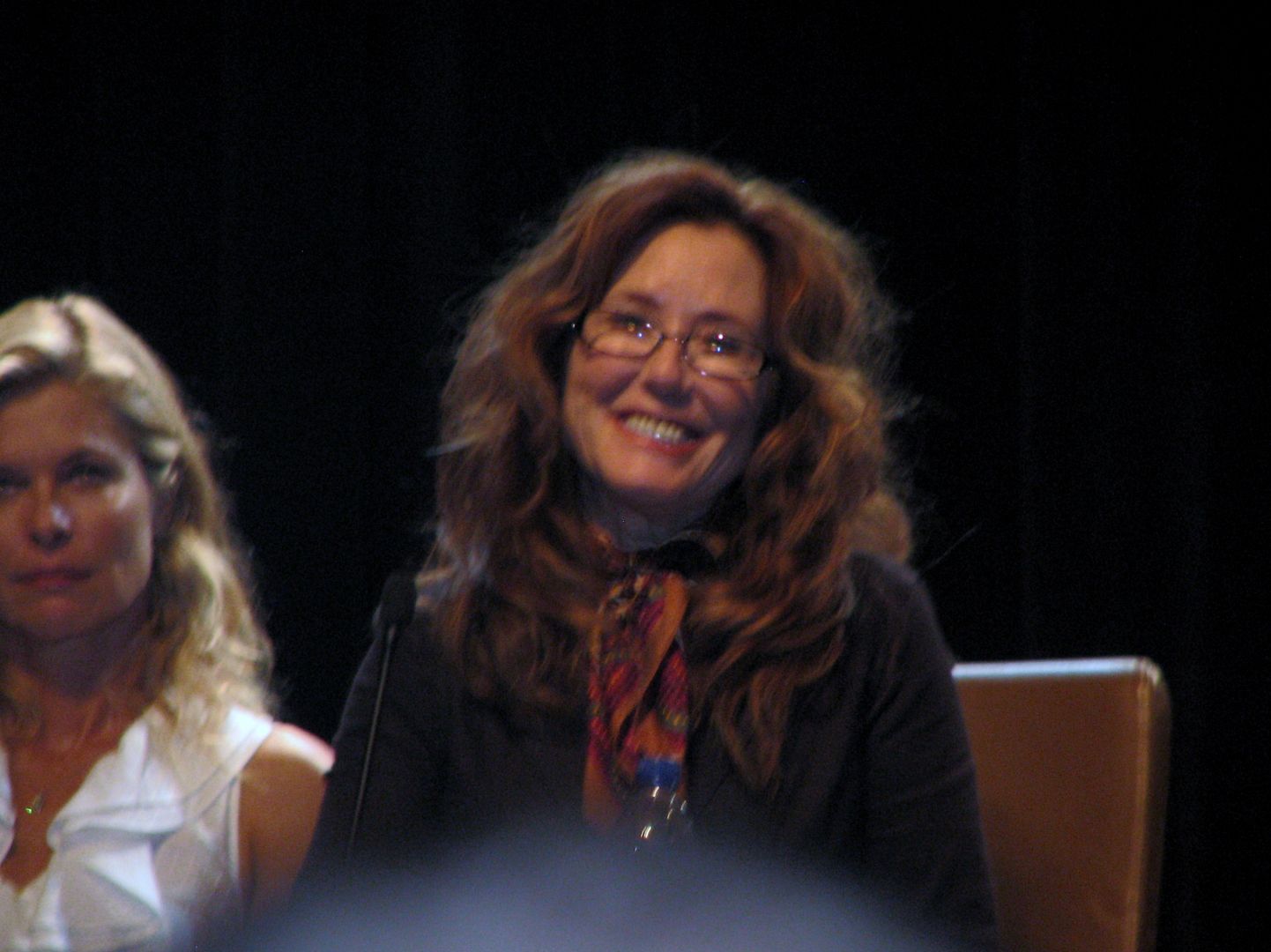
Who wouldn't want this woman as their President?
An audience member asked Mary McDonnell whether she would vote for Laura Roslin if she ran for president in 2012, but then qualified the question with—politically. Mary McDonnell said that while she thinks Laura had a lot to offer, and some qualities we all could use, that there are some other women who are better qualified.
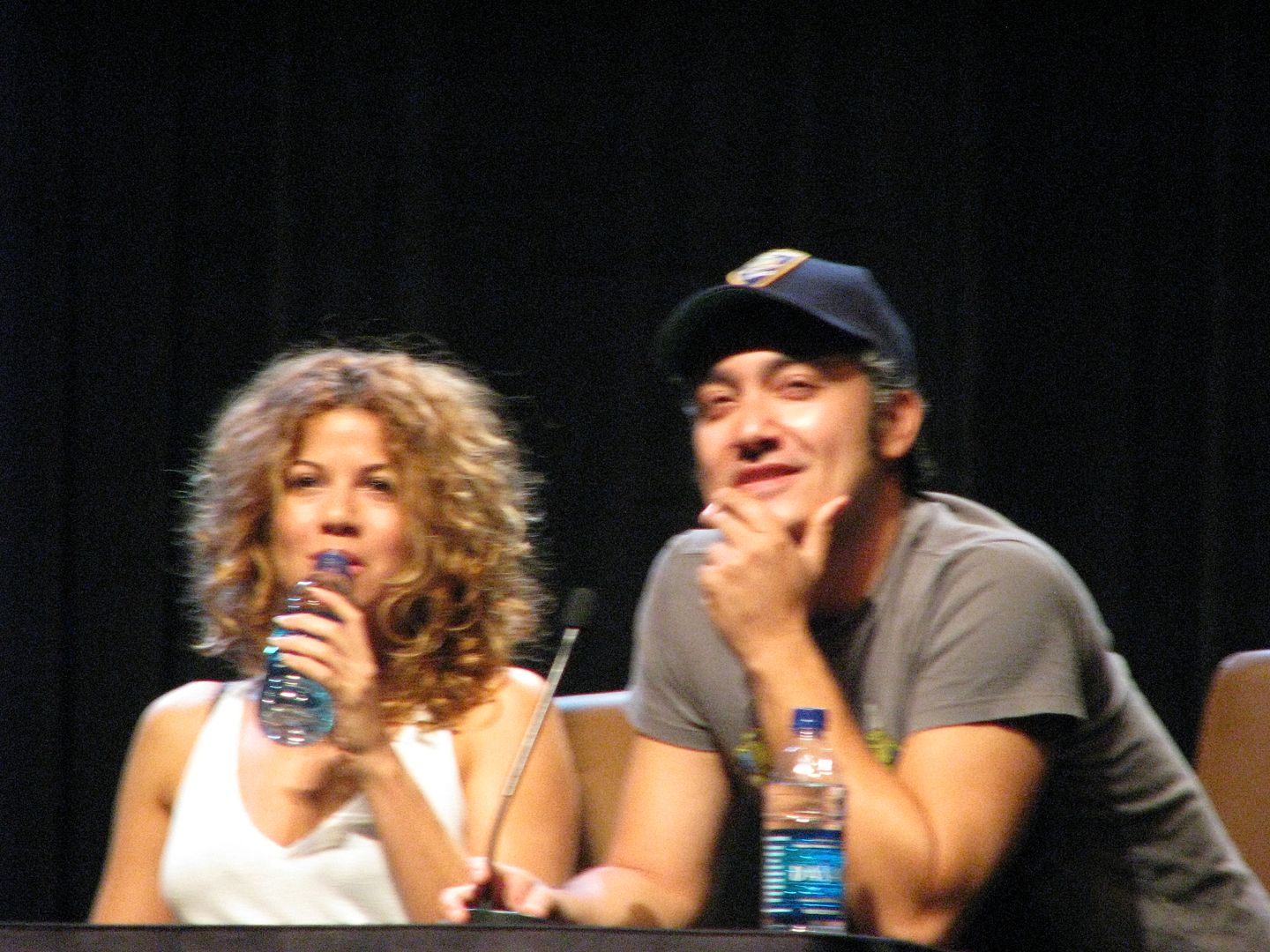
Alessandro Juliani ponders the larger meaning of Felix Gaeta's mutiny.
The moderator then had a question for Alessandro: If Dee hadn’t committed suicide, would Gaeta have gone through with the mutiny? Juliani pondered this question for a while, and noted that Gaeta had gone through many other forms of hell prior to that, including being shot in the leg by another member of the panel [Michael Trucco’s character, Sam, shot him in the episode Faith]. In response Trucco joked, “I missed!”
Mary McDonnell was asked about her new role on The Closer. Mary said she’s greatly enjoying it, and the mini movie provides some exciting news in that regard. She then went on to describe how very awesome and supportive the set is, much like that of Battlestar Galactica.
The next audience question–directed to both Kate Vernon and Mary McDonnell–was whether, given the “bromance” between Saul and Bill, there have been room for a friendship between Ellen and Laura Roslin. Kate said that given how “lonely” Ellen was, she thinks that Ellen would’ve very much enjoyed a friendship with Laura, but that she’s not so sure Laura would’ve reciprocated, and as given that Ellen doesn’t handle rejection well, that she probably wouldn’t have even reached out. Mary McDonnell added that she thinks there should have been a night of drunken revelry. On a more serious note, she went on to say that she thinks that’s a major issue with Battlestar Galatica, in general, that most of the women (save, she noted, for Six) were quite isolated, and that not only did Laura not really interact with Ellen, but that she doesn’t think that she even had a scene with Kat.
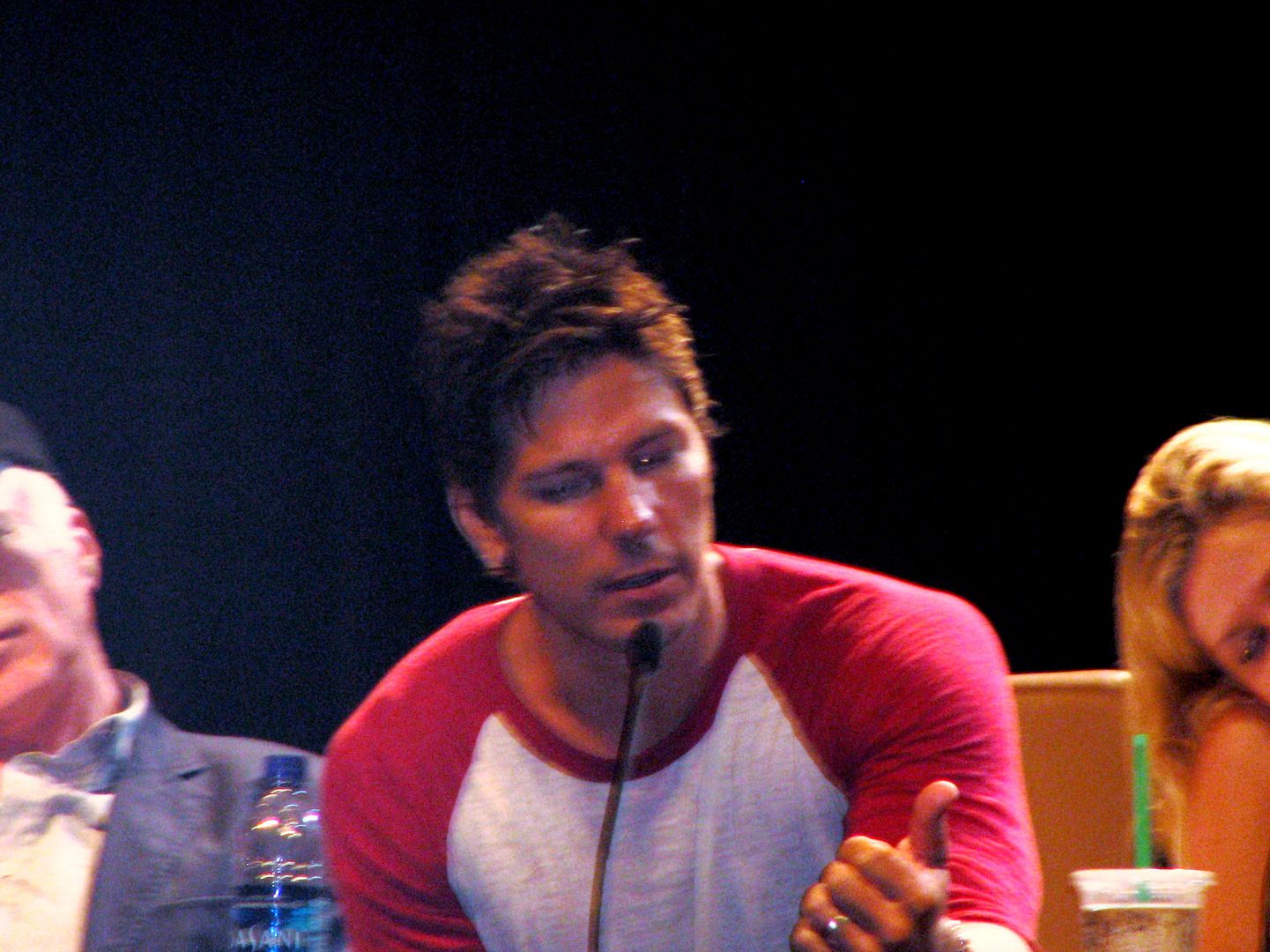
Michael Trucco answers a question at the Dragon*Con Battlestar Galactica panel.
The moderator’s next question centered on Sam’s relationship with Kara. Specifically, if— in the tub of goo—Sam were to happen to have a revelation, what would he say to Kara. Trucco said that he liked what he did say to Kara—”See you on the other side”—but that alternatively “Hand me a towel” would have been a good choice.
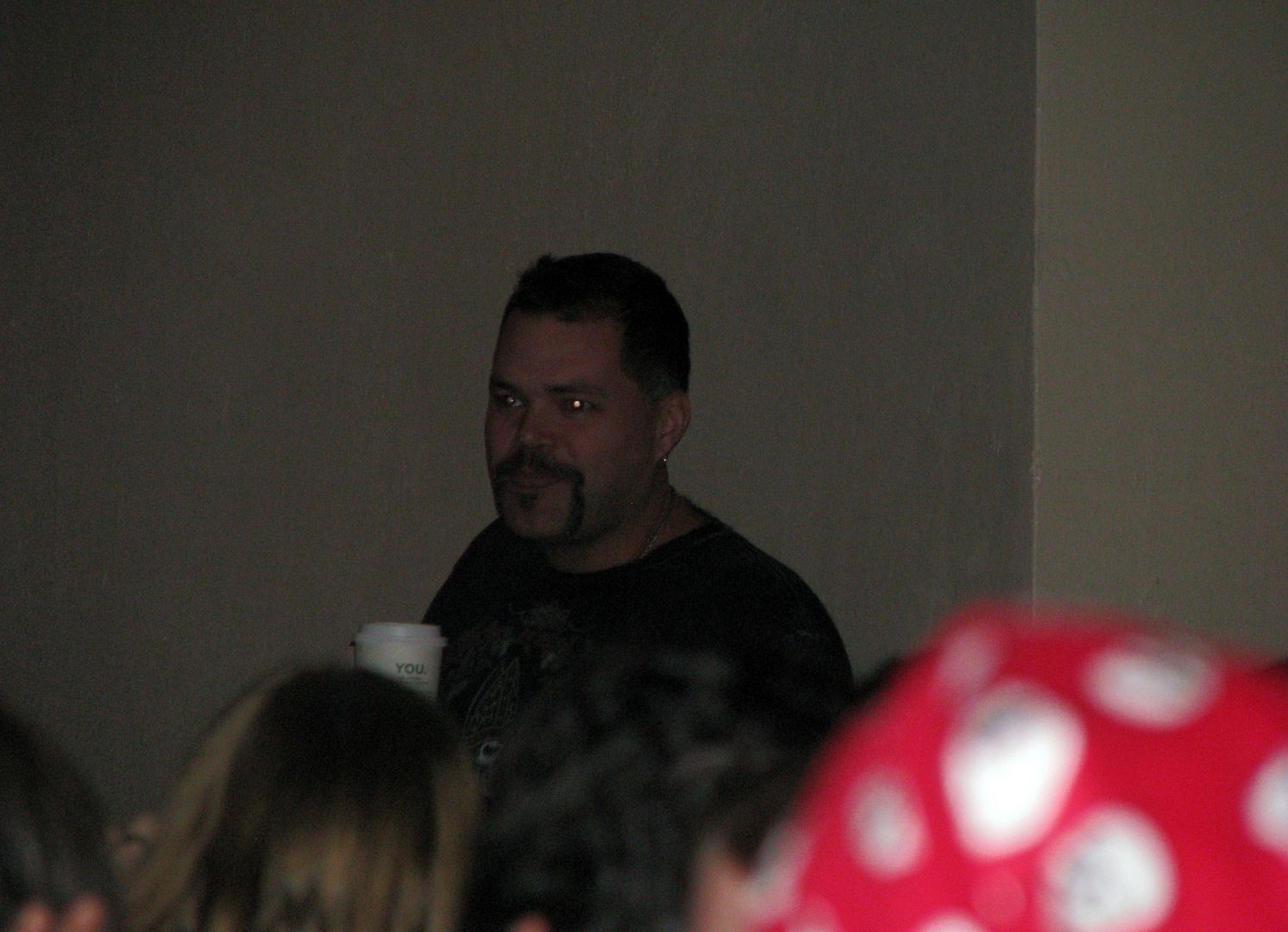
Panel crasher Aaron Douglas
At that point, the panel was interrupted with a question from the wings. Specifically, the person wanted to know whether they remembered an attractive, intelligent cast member, named Aaron Douglas. The punch line, was, of course that the person asking the question was Aaron Douglas. The cast laughed and Aaron was ushered on-stage with the rest of the cast by Mary McDonnell.
The next audience question was whether any of the issues that Battlestar Galactica had dealt with challenged or changed the actors’ personal beliefs. McDonnell’s response echoed her discussion from Day 1’s BSG panel, “Okay, do you want to talk about health care?” On a more serious note she said that the role woke her up a bit more and taught her the importance of listening harder. Kate Vernon built on that by noting that it’s really hard to mentally put yourself into a situation at all where there’s such a small amount of people left, but still such rampant violence and destruction of life. Kevin Grazier mentioned that Ronald D. Moore and David Eick had said that they weren’t doing their jobs if you don’t ask at least once per episode “Am I rooting for the wrong team here?” Mary McDonnell agreed and said that the suicide bombings portrayed at the beginning of the third season were the centerpiece of that idea.
Alessandro Juliani was asked whether or not he would have liked to have been a Cylon. His succinct answer was, “I SO wanna be a Cylon.”
Luciana Carro [whose character died midway through season 3] was asked what part of the last season she would’ve liked to have been a part of. Her answer was “the finale.”
The cast was then asked to recite their favorite lines. In order they were:
Luciana Carro: Starbuck, my cup runneth dry.
Kate Vernon: I have my ways.
Mary McDonnell: I’m coming for all of you!!
Michael Hogan: It’s in the frakkin’ ship!
Aaron Douglas: Any time his character had ad libbed.
Alessandro Juliani: If you drink enough ambrosia [pulling his shirt down to show the tattoo that he’d revealed during the time he said the line on screen], it doesn’t hurt.
Michael Trucco: Lighten up; it’s only the end of the world.
The following question addressed the “game changing moments” and whether anyone on the cast had any particular favorites. Kate Vernon said that it was such an evolutionary process and that through the scripts and the re-writes it was really hard to identify anything. Aaron Douglas said that he really liked killing Tory in the finale. The enthusiasm he had in describing the joy he took in snapping her neck with his bare hands seemed to surprise Mary McDonnell, who whispered something to Kate Vernon. [One can only speculate what she said, but in speaking with other women in the audience later, the consensus seemed to be that they might have found Douglas’ perspective rather misogynistic.]
A question about Laura’s temporary cure from Cylon stem cells in Season 2 led Mary McDonnell to reveal that the original plans were to delve much more deeply into the implications of her cure, but that for lack of time it was not brought up again until the time of her relapse at the end of season 3. The questioner then followed up by asking whether Mary felt that Laura’s cure was contrary to Ronald D. Moore’s original manifesto of avoiding the clichéd “quick fixes” of science fiction. McDonnell said that quite the contrary, it was not a “fix” at all, but rather a way to think more deeply about the fusion of two races and that the blood that “cured” her was a foreshadowing of the idea that in order to survive the two races needed to come together.
Alessandro Juliani was asked how much notice he had of the role Felix would play in the mutiny. He said that story-line had been mapped out for a while, and that Ronald D. Moore had called him. He also added that he really enjoyed, overall, the freedom to flesh his character out, including adding such elements of his own making, like Gaeta’s “crush” on Baltar.
Kate Vernon was asked about the growth of her character, or more precisely, whether the viewers were right in seeing Ellen as kinder, gentler, and a bit less devious after her return. Vernon said that in fact after Saul poisoned Ellen, when she came back she “downloaded into who she really is.” With that knowledge, the character was centered and no longer there to start trouble, but that rather to heal and get back to her husband. Vernon introduced a bit of a lighter note into the discussion, adding that returning to find Saul sleeping with a “Six” (who was, for all intents and purposes, their daughter) really threw Ellen into a “WHAT??!” reaction.
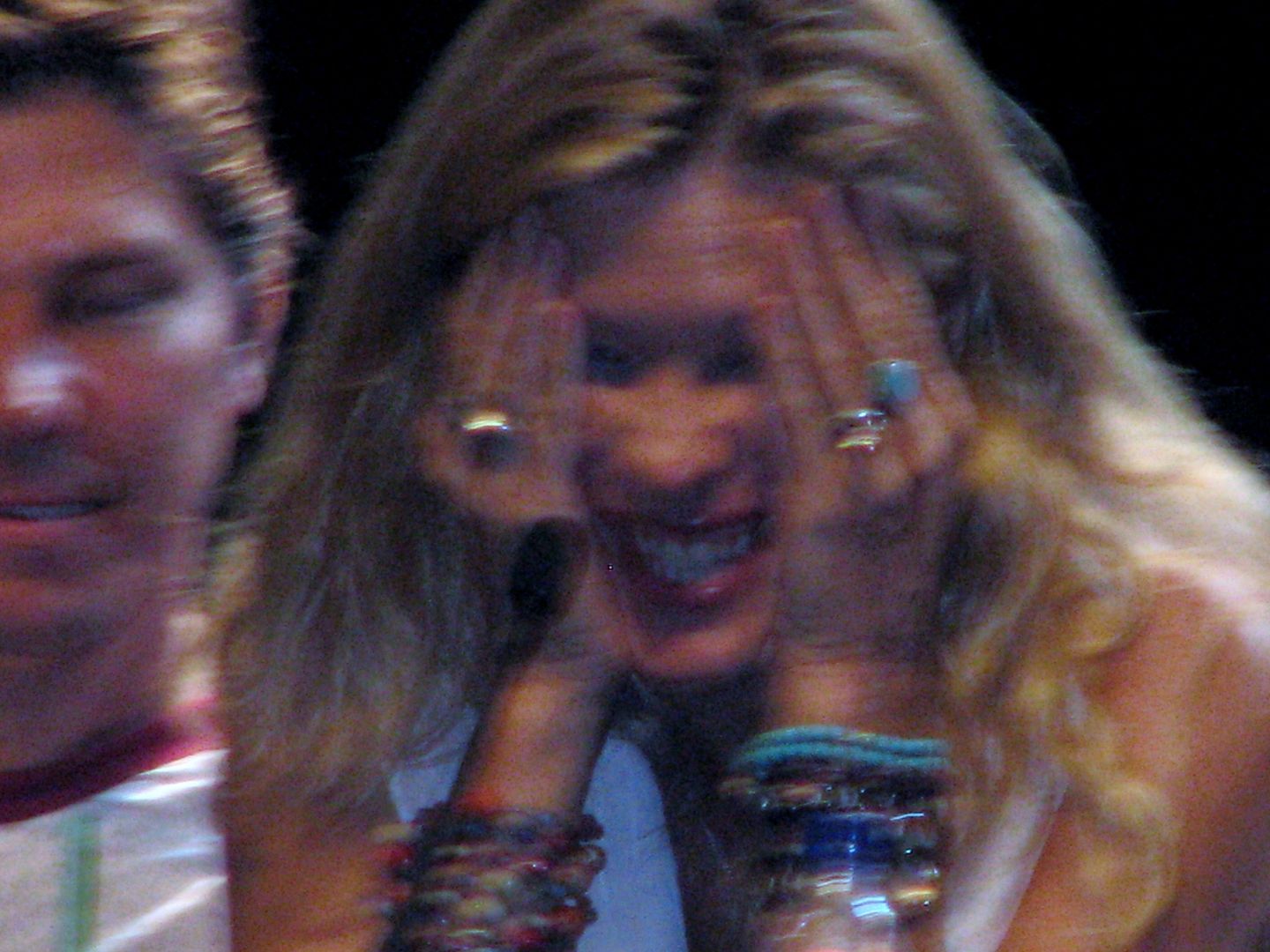
Kate "Lucky Legs" Vernon.
The next, initially straightforward question, provided a great deal of unintended levity. The questioner wanted to know whether the panelists had any pets. Luciana Carro has two cats, two dogs, and a “Chinese” [she might have meant Siamese] fighting fish. Alessandro Juliani very dryly noted that while he has no pets he’s considering a turtle for lawn maintenance. Mary McDonnell’s dog is a German Shepherd/Lab/Pit Bull mix named Jocco that was adopted from a shelter. Kate Vernon then began talking about her two long-haired dachshunds, and the discussion went something along the lines of, “and the girl’s name is Lucky Legs . . . now wait, the boy’s name is . . . oh, shoot! The girl’s name is Legs Diamond and the boy’s name is Lucky Knuckles, the gangster.” Mary McDonnell interjected with, “yes, and it’s Kate who’s named ‘Lucky Legs.’”
A question for the characters who represented the Cylons asked what the knowledge of their real identity brought out in them. Aaron Douglas said that he initially hated it, but later regarded it as a great big cosmic joke, which you can often see as he’s quietly smiling to himself during the more dramatic moments. Michael Trucco said that for his part it brought out a heightened sense of confusion and paranoia, which, as Alessandro Juliani pointed out, led to his shooting a fellow crewman. Michael Hogan said it was his worst nightmare, and likened it to waking up one day to discover that you’re not Pakistani, but Israeli, and went on to talk about the dream sequence where he shot Adama because he not only feared, but truly realized he was capable of doing so. Kevin Grazier built on that by mentioning a scene that was cut from Season 2 where it was revealed that Tigh had actually brought down Cylon Centurions with his bare hands during the original Cylon war. He is truly the most dangerous man in the fleet.
For the final question, the cast was asked what they do to get focused. Luciana Carro replied that a friend of hers was a musician and made her a collection of mantras that she used to listen to in the trailer. She added that for the finale, she listened to Gnarls Barkley, and then asked, “you know the song . . . Maybe I’m craaaaazy . . ..” Appropriate enough, Luciana.
The panel I attended after that was for Twilight. The two participants were Peter Facinelli (who plays Carlisle Cullen) and Justin Chon (who plays Eric Yorkie). Michael Welch (who plays Mike Newton) was also supposed to be there, but had to cancel. The panel opened with Peter Facinelli saying that he “liked sitting with us in the dark.”
The moderator then asked both stars to describe the process of getting the role. Chon said he had to audition just like everyone else. Facinelli said that he’d been invited to do the role but wasn’t interested, and then later read the book and couldn’t put it down. He initially didn’t get the role, because they had someone a bit older in mind, but he liked [director] Catherine Hardwicke as a director, and as such sent her a book on Vampire Movies through the Years. The person originally cast in the role didn’t work out, and Hardwicke then went back to Peter Facinelli. He jokes that it was the book that got him the role.
Facinelli then described how weather issues impacted their filming—that for most movies they sit around waiting for sun, but that for this movie, they had to sit around and wait for cloudy weather. In telling these stories, he began to talk about issues on set resulting from the weather and described the work his stand-in had to do, and issues resulting from the time spent at the craft services table as the weather got bad, and he wasn’t able to go to the bathroom when he wanted.
The two participants were asked why there wasn’t a blooper real on the DVD, and if there were any bloopers they could share. Chon then told a story about a wig that they’d put Robert Pattinson in for early days of the shooting which made him look like a “long haired woolly mammoth.” Facinelli said that given the budget and the schedule they were shooting with, they couldn’t really afford to have bloopers.
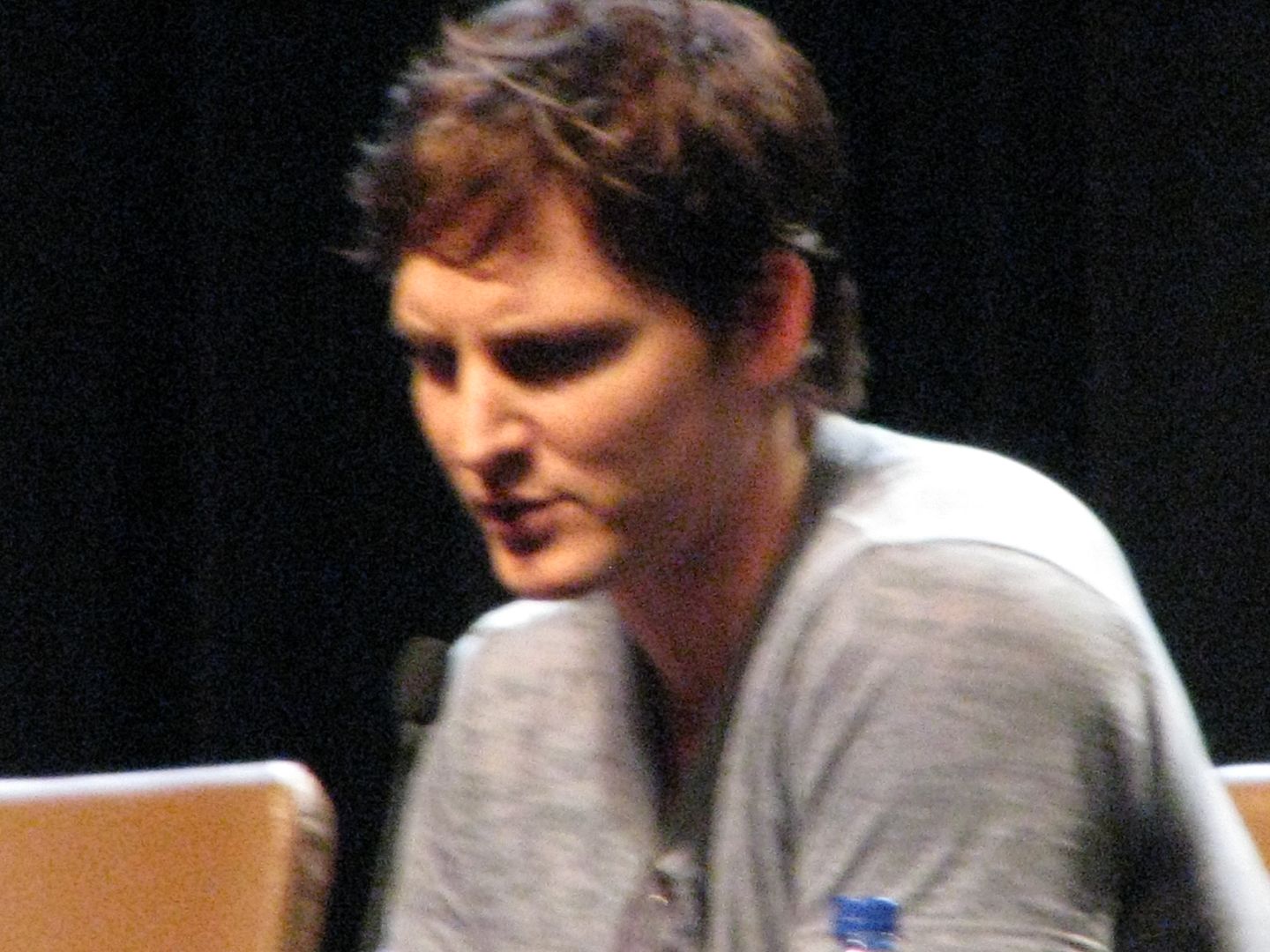
Peter Facinelli discusses his roles on Twilight and Nurse Jackie.
The participants were asked what their next projects were. Peter Facinelli is playing a doctor in Nurse Jackie [which ScriptPhD.com reviewed], and then mentioned that he was very excited to have finished, and seen a rough cut of the next series installment, New Moon. He said it was marvelous and affirmed that, “I’m a fan, too!” Facinelli said he’s playing a very different type of doctor in Nurse Jackie, and that he very much enjoyed exploring the differences between humans and vampires. He then went on to discuss some research he’d done for his doctor role in New Moon where he had to give stitches to Bella. They’d brought some physicians in to teach him how to give stitches and, tired of practicing on Styrofoam, he eventually moved on to putting stitches in chicken breasts as he thought it might be more realistic. He brought some samples to his co-star, Kristen Stewart, who much to his chagrin found them unconvincing and said she’d never let him stitch her up. He also said that he’s pretty sure his maid was terrified to come into his house and find all the remnants of his handiwork.
The next question was about the type of scenes they like to do, and Facinelli said he tends to love to do scenes that show the whole Cullen family together. Moving into a tangent, Facinelli then described his work on Hollow Man II in which he had co-billing status with Christian Slater, but that given the plot of the movie [Slater was invisible through the course of it], he never actually interacted with him.
A member of the audience asked Chon what he thought of [his co-star] Taylor Lautner [who portrays Jacob Black]. Chon said, “I think he’s gotten really, really big,” before adding that he’s a very nice guy and is genuinely unaffected by all that’s happened.
The last question involved their favorite vampire, and Facinelli said he really liked Buffy until several members of the audience informed him that Buffy wasn’t actually a vampire.
We also learned that Facinelli has an extremely popular Twitter account. He tries to keep his fans updated while still respecting both set secrets and the privacy of his coworkers and family members. He was also a very good sport related to a very young audience member who asked to give him a kiss. He lifted her on the stage and let her do so.
The final panel of Day 2 was one called Battlestar Galactica: the Last Half Hour, or Frakking the Daggit. Unlike the other BSG panels, this one was part of the science track and so the participants were not cast members, but rather scientific experts who were there to cast their views on the finale. The moderator of the panel opened by announcing that he was thinking about putting a red line down the middle of the room to divide the audience based on their opinion of the finale. He then went on to add that he had no problem with the acting, special effects, or music. His primary question was: was [series creator and writer] Ronald D. Moore possessed by Ed Wood.
After that very provocative opening, he went on to explain that in classic BSG terminology, “Frakkin’ the Daggit” translated to “screw the pooch,” and that his understanding was that Kevin Grazier had long lobbied to get that phrase incorporated into the series, but it never happened.
From there, the panelists introduced themselves: Barbara Drescher, a cognitive psychologist who teaches research methods, memory learning, and statistics; Christopher Barrett, a forensic anthropologist; and A.C. Trenya, an aerospace engineer who does advanced concepts work for NASA
Drescher opened the conversation and said that for her, there was a point for her at which finale really flipped and she wished she hadn’t seen the series at all, and that was Kara’s disappearance. She went on to explain that her problems aren’t so much with the science of the show. Rather, her problem is with the message in the end, and the message is: knowledge is bad and human beings can’t handle it.
As might be expected given his background, Barrett’s problem is with the portrayal of early homo sapiens, and that in his opinion to portray them as pre-verbal, was not accurate. He feels that the writers took too many liberties with Mitochondrial Eve. He went on to say that when you look at the Wikipedia entry for Mitochondrial Eve, every single factoid about her is in the last episode.
Trenya, by comparison, liked the finale. He felt the show was ultimately about existentialism, in the sense that the world is something we don’t have control of. There is death, but through all of that, we still survive as human beings on a grander level. He said a pertinent example would be film noir, which deals with these motifs; these are very good and dramatic movies and TV shows, and that in his point of view Battlestar Galactica is a scientific film noir.
Drescher corrected Trenya and pointed out that existentialism is not a property of the outside world, but the inside world. We don’t survive in spite of ourselves; we survive because of ourselves. She was fine with the message of the show, in general, not being about knowledge; it’s a drama. But she amended that point of view to add that there was a big plot hole related to Kara Thrace being harbinger of death and it was a large literary problem.
Trenya said that he felt that the ending was definitely right for each character and that in BSG they were literally kicked out of their world. He said that the tipping point was the trial of Gaius Baltar and the revelation that we are not a civilization, we are a gang. That moment made the point that our civilization is over, and we go on a divergent path – but we stay ourselves.
Drescher countered that her beef is not with how close the characters are to us, but with the message that this medium puts out there that there’s this huge power with a plan and that apparently wants us to go through hell only to destroy everything we built and start over again.
Barrett said that he had a very big problem with the lack of consistency in final episode which he saw as mixing in scientific explanation with deus ex machina. Your correspondent was unable to keep her mouth shut at that, and from her seat in the audience quipped that she couldn’t really see their problem – after all it’s what the Bush administration’s been doing for 8 years with ‘intelligent’ design. Their response was to note that politics and television are two different things. The moderator then noted that the deus ex machina aspect was particularly troubling to him, and that Aristotle criticized that particular approach to storytelling as bad writing.
A member of the audience stated that while Ronald D. Moore may be a very effective storyteller, what he knows is how to write episodes not series. A second audience member then noted that it was really stupid to throw [all the buildup of the first three seasons] away. Drescher agreed, and said that while she usually believes it’s kind of silly to think of what a fictional character would do, but in this case it’s easy to say nobody’s ever done it, because it’s stupid.
There was a long discussion following that comment, about whether there would even be any colonists left after a few months given the need for such basics as medicine and their exposure to unknown hazards.
Another audience member noted that the religious theme of the show was something that was there from the beginning. The moderator noted that he understands those in charge were kicking around various endings until the last minute and called out the [missing Cylon] “Daniel” subplot as something that was dropped that shouldn’t have been.
Trenyo said that he watched for ideas of connections, and that Ronald D. Moore picked Mitochondrial Eve as a way to connect the show to ‘us’. Drescher agreed but added that there’s a big difference in the way that religion was presented throughout the show and that up to that point it was a lot of mysteries that may have had a scientific explanation – but at the end it was, ‘here’s this miracle’. The moderator said that in his opinion there was an implied contract with the audience and the writer that “I’m going to devote some of my finite lifetime to paying attention to what you’re doing, so make it worth it.” He went on to hold up Babylon Five as an example of a show that dealt with similar religious aspects but provided a satisfying ending.
An audience member said that he was not sure he agreed that the theme of technology in and of itself was bad, but rather that the issue was ‘bounds of technology’ – are we going to repeat the same mistakes? Drescher said that the show did in fact have that message that technology was bad, and pointed out that Lee called technology “baggage,” and said we’re immature. The moderator then quoted directly from the episode, “our minds outraced our hearts,” and added it wasn’t just technology the colonists left behind, but also art and culture. This opened the point to complain a lot more generally about the finale, and in particular what the point was of the pigeons. Most people really didn’t get that allusion and felt it was an example of badly over-dramatic story-telling.
Barbara Drescher then said that one thing she did agree with was Laura’s ending, and that even if on an emotional level, she wanted a miracle cure in the end, she felt that it would have been cheap. By comparison, she asked, “What are we supposed to think Lee does? Only screw people from Galactica, remain celibate, or hook up with a cave woman.” Trenya remarked that the whole show was about conflict and tension, but once they got to earth, it seemed like an exhale, as though the writers had just given up, and everything seemed too easy.
Most panelists agreed and then returned to the issue of the reveals at the end relative to the people’s roles and religion, and the moderator said that if these were things that had been talked about at different parts throughout the series it would have been easier to swallow.
The moderator then showed a clip of the last half hour that he’d modified with pithy subtitles. One particular aspect was pointing out the location of the sun over the Earth with the subtitle “Noon in Africa,” then the BSG-produced subtitle over a closer shot of the continent read “12 Hours Later,” and the moderator’s subtitle, “It’s STILL noon in Africa,” as clearly the shadows remained in the same place.
At the end, the moderator pointed out that Kevin Grazier was BSG’s science “advisor,” and a really good guy. He noted that just because Grazier’s a science advisor, doesn’t mean they have to follow his advice. He said he’s seen nasty things about him [especially after some remarks given in this interview], and thinks it’s unfairly directed criticism. We here at ScriptPhD.com, knowing Kevin personally to be a terrific person and a great fan of the show, cannot agree more.
And finally, the Day 2 costume of the day is a rather inventive approach to last-minute planning:
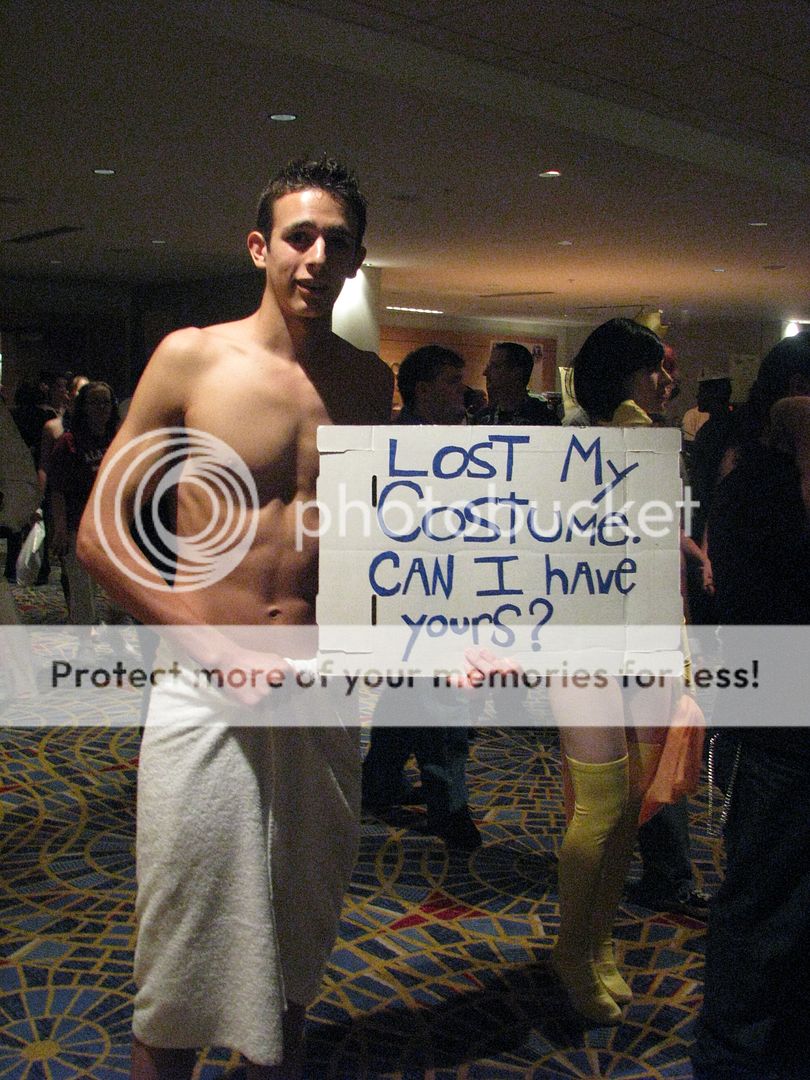
Yes. Yes you can.
DAY 3
There was only one panel that I was able to attend on the third day of the Dragon*Con, and it was another Battlestar Galactica panel. The participants in this particular panel were Luciana Carro, Richard Hatch, Kate Vernon, Michael Trucco, Alessandro Juliani, Michael Hogan, and Mary McDonnell.
The moderator opened the floor for questions very quickly, and the first question was what their characters didn’t do, that the actors would’ve liked them to do. Most participants answered they would have slept around a lot more. Mary McDonnell said she would’ve had Laura get drunk and then, in reference to the previous days’ round of questions about spending time with other women on screen, added, “. . . with Ellen.” Alessandro Juliani said Felix would have let Laura steal the election. Kate Vernon, with a slight smirk, said she would have slept with Adama. When asked “which Adama,” she smiled a little more deeply, looked between Mary McDonnell, and Michael Hogan, and said, “both of ‘em.”
The next question centered around a comment that (executive producer) Ronald D. Moore had made during the podcast that he saw the end of A Disquiet that Follows My Soul as the first time that Adama and Roslin consummated their relationship, but that the actors saw it differently. The audience member asked if McDonnell would elaborate on those differences and provide her own perspective.
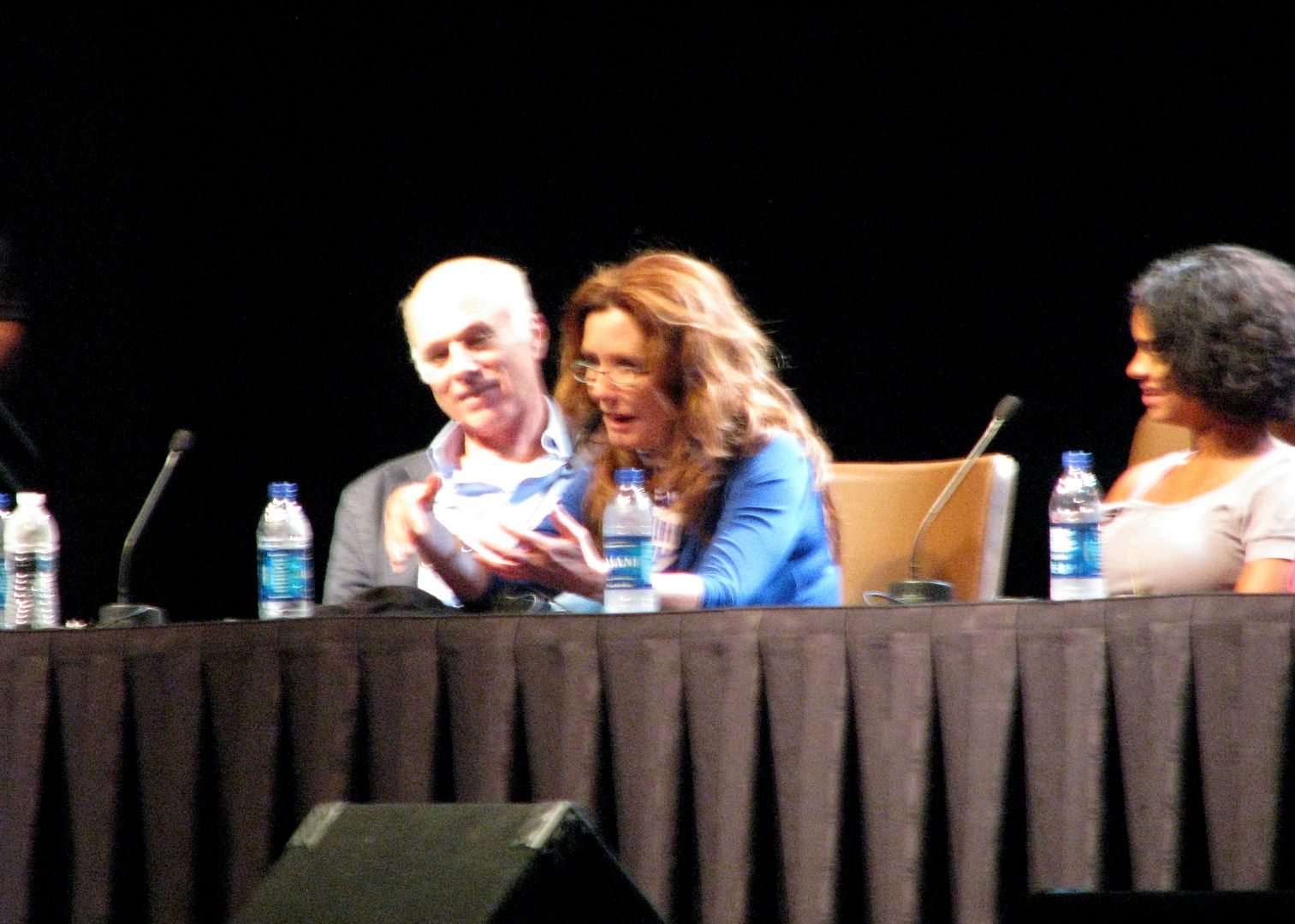
Paul Hogan hangs onto Mary McDonnell's every word (and why wouldn't he?) at Dragon*Con.
McDonnell said that Edward James Olmos very vehemently believed that Adama and Roslin had been sleeping together since the second season (she did not elaborate when, however). She said that in thinking about it, she probably agreed with Ronald D. Moore. [Previous interview with Ms. McDonnell hav indicated that the missing year on New Caprica (specifically in and around the Unfinished Business flashbacks) are when she considers the start of the sexual relationship; this may well be a moving target.]
A young boy in the audience then asked the panelists what the “coolest” thing their character had ever done was.
Alessandro Juliani said, “I took over a whole Battlestar. It may not have been a very good thing to do, but I gotta admit that standing there in Adama’s spot in CIC, I had a moment of . . . yeah, this is cool.” Then Kandyse McClure responded, “ Saving Starbuck. That was cool. Flipping Apollo.” More quietly, she added, “Frakking Apollo.” Kate Vernon said that she thought being resurrected as “The Mother of all Cylons” was pretty cool. Michael Hogan mentioned that he got to beat up some young people in Season 2. Remembering the age of the person asking the question, he added that they were Cylons; they had it coming. Michael Trucco simply stated, “I flew the ship into the sun.” Mary McDonnell who passed initially, then said, “I talked about this yesterday, and that was . . . trying to steal the election.”
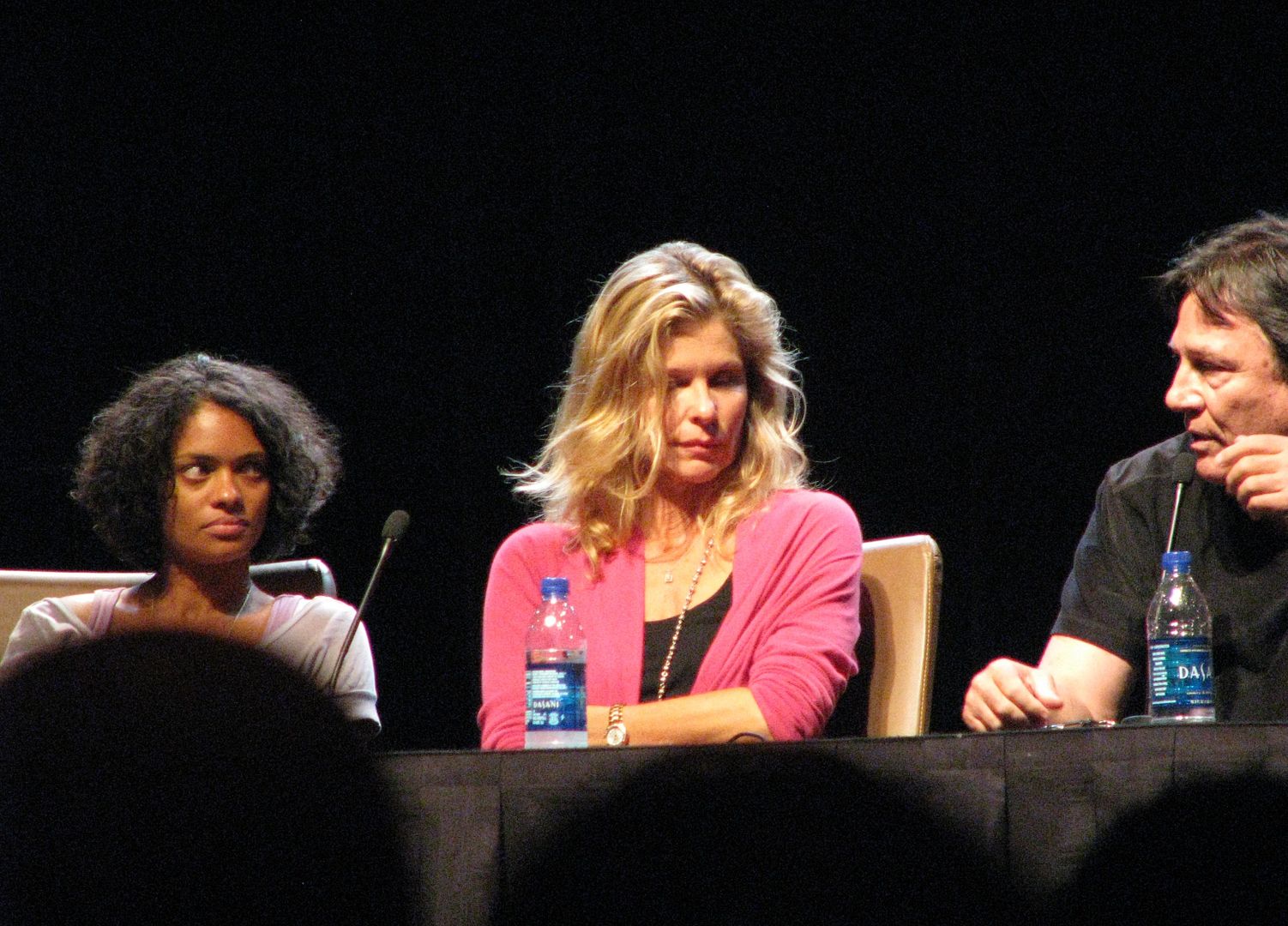
Richard Hatch pontificates. Kandyse and Kate are not amused.
Richard Hatch’s answer was the most extensive. He said that while he wasn’t sure it was necessarily a cool thing to do, that what he found to be the most important and significant thing his character ever did, was, during the course of the Season 4.5 mutiny arc, leaving a Quorum meeting only to turn around and give the order to have the entire Quorum assassinated. Seeming to gauge the general audience reaction surrounding that really shocking and uncomfortable moment, he went on to explain that as originally written the Quorum had agreed with Zarek, and that he’d lobbied to have that changed as it was inconceivable that Tom would kill allies.
From my position at the microphone, I asked the next question. Specifically, I addressed my question to Kate Vernon and Michael Hogan. I noted that the relationship between Ellen and Saul was easily the most dysfunctional on the show, and yet, also the most eternal and deeply loving—surviving not only 2000 years but also death. And then I asked what it was that kept these two together in spite of themselves.
Hogan cheered the question and then deferred to Vernon to answer. Vernon seemed caught off guard by the toss, but ultimately said she would try to answer seriously. She affirmed that these two people had been together for thousands of years, and that as she saw it, they needed each other. There was a level of “intractability” to their relationship, and that—no matter what—they would always find their way back to each other. She then said she hoped that her answer was more coherent than the answer of the previous morning [when it was too early for her to remember her dogs’ names].
The next question was directed toward Mary McDonnell, and was what she thought about the use of books as a symbol for the relationship between Laura Roslin and Bill Adama.
She initially seemed to get a little choked up, and then said, that she “really liked it,” then, seeming to get in touch with a more mischievous side, said, with a deliberately deeper meaning, “he read very slowly, and [pausing to suppress a giggle] she really liked it.” Returning to the broader implications of the question she said that “the idea of enjoying literature as a romantic activity” is not something that we see anymore—that it’s lost, and it’s very easy for her to become emotional about it. She concluded with, “so yeah, I really like it.”
Mary McDonnell received the next question as well, and it was very specific. The questioner referred to a brief scene in No Exit when, after being questioned by Bill Adama, Laura Roslin, and Saul Tigh, Ellen Tigh asks for a drink, and it’s Bill who unstraps the flask and passes it to Ellen. The questioner noted that though Laura remained silent during that exchange, the expression on her face is very unhappy, and wondered if, at some point, Laura ever confronted Bill about what happened.
McDonnell asked the questioner to identify herself again, and she did so. She then nodded, and said, quite enthusiastically to the questioner, “You’re very smart.” She went on to say that she felt that way because the questioner had clearly picked up on some real subtleties in the acting given that there had been no dialogue or other outward sign in that episode [to suggest otherwise], but that yes, in her view Laura was very threatened by the idea of Bill’s drinking, and she had no real way to express that feeling. She then said that no, Laura never did confront Bill about that moment or his drinking in general.
Another audience member wanted to know whether the reason that Laura began to dress more femininely and act more flirtatiously in the third season was because she was closer to death.
McDonnell disagreed. Instead, she said that it was because the writers began to trust in Laura’s power, and because of that she could have a little bit of fun. She said that she was playing a woman who didn’t want to be president, and who didn’t like politics and that until Laura (and by extension the writers) were comfortable in that role, it wasn’t possible for her to also be a woman.
The moderator then asked Kate Vernon, Michael Hogan, and Michael Trucco to—without giving away spoilers—describe the upcoming movie, The Plan [which will cover events during the New Caprica arc from the Cylons’ point of view and is directed by Edward James Olmos].
Michael Hogan said that between what was revealed about the Cylons in season 4.5, what is revealed during “The Plan,” it’s really hard to keep what the audience does, and does not, know straight in his head. He went on to tell the audience that Jane Espenson had actually written a very detailed 5,000 year history of the Cylons, and even that’s hard to keep straight because it predates the events in Caprica. He said that it was really fascinating to have Edward James Olmos go back and re-edit footage that had been shot previously, and it provided him with a lot of “Aha!” moments. Without spoiling any details, Kate Vernon said that there is an “innocent yet creepy” scene between Cavil and Ellen, and we’d know it when we saw it.
The next question was for any of those portraying the “Final Five” Cylons, and whether, after their Cylon identity was revealed, they were “erased” from Laura’s white board [the board in her office that keeps the tally of remaining alive humans]. After a lot of laughing from both the audience and the panelists Mary McDonnell answered in one word, “Absolutely!”
An audience member then wanted to know what Laura had told Bill Adama about what happened to her on New Caprica. Mary McDonnell said that as she saw it, Laura was sheltered a bit—even in prison—given the “weird and complicated” relationship that she has with Gaius. She said that even so, given how private Laura is, she probably didn’t tell Bill anything about that, but only told him about what had happened to “the people.”
Alessandro Juliani was asked about the “mancrush” Gaeta had on Gaius Baltar and how that had developed. Using an allusion to another pop culture phenomenon [The Simpsons], Juliani called Gaeta, the “Smithers to his Burns.” He said that Baltar was an “omnivore of sexuality” and that it was really conceivable that pretty much anything had happened on New Caprica. To which Mary McDonnell indignantly cried, “In my airplane??!” [Gaius Baltar’s offices were in the grounded Colonial One]
The next question caused a great deal of consternation among the panelists. Specifically, the audience member wanted to know what each member of the cast would do if they had the opportunity to spend time with their character for a day.
Mary McDonnell [who’s dislike of Laura’s wardrobe has been something she’s joked about before] initially quipped that she’d take Laura shopping. Many of the other panelists tried to pass on the question saying it was too hard, too detailed, and too complicated. Mary began to say, she then wanted to talk about why it was that no one wanted to answer the question, and then as others began to murmur joked, “oh, no, here she goes again . . .” Kate Vernon then picked up the conversation and said it really was hard, because she’s not at all like Ellen. She said that she admires parts of her, but that “if I were to meet her I’d be a little nervous and I’d want to know that she’d be a ‘friend to women’,” and that she’s not entirely sure that Ellen is. She said that perhaps she’d take her to a yoga class and then see what happens without the external influences of booze and men. [Very interesting idea, Kate!]
The cast was asked about how the Writers’ Guild of America strike impacted their work. Mary McDonnell talked about how it coincided with shooting the “first” Earth landing, and that it was the last day they were legally allowed to work. She said they had a lot of cranes and the whole set was full of decimation and they were trying to portray the human beings in shock, but that every time the director yelled, “cut!” the whole cast whipped out cell phones to immediately began talking to their agent, and that in her memory it’s the only time there were really cell phones on set at all. Once they were back in LA, she said that the focus immediately turned to the writers and how they could support them, and that she didn’t worry too much about the show because Ron [Ronald D. Moore] had promised they’d be back, and she believed him.
Michael Hogan said that Edward James Olmos had said [the show was] canceled, and, doing his best Edward James Olmos impersonation she said, “yeah man, I just heard from my agent. That’s it.” Mary then turned to Michael and said, [referring to Edward James Olmos] “and he answered your call; he didn’t answer mine.”
To conclude the panel, the moderator asked Luciana Carro about her upcoming role on Caprica. She said that she’s very happy to be on the show, and that the character she plays is not Kat nor Kat’s grandmother, but someone else entirely and that as far as she knows, she’s also not a Cylon. Mary McDonnell said, “and she has amazing shoes,” at which point Carro explained that she gets to wear 4-inch heels.
After that Michael Hogan, very emotionally thanked all of us for coming, as it’s only at this sort of event that he gets to get together with so many of his fellow cast members, and that he really likes being here. Mary McDonnell agreed with him and thanked us all for being the “best fans in the world.”
So say we all.
In that spirit of generosity and thanksgiving, it only seems appropriate that the third, and final, Costume of the Day is Storm Trooper Elves:
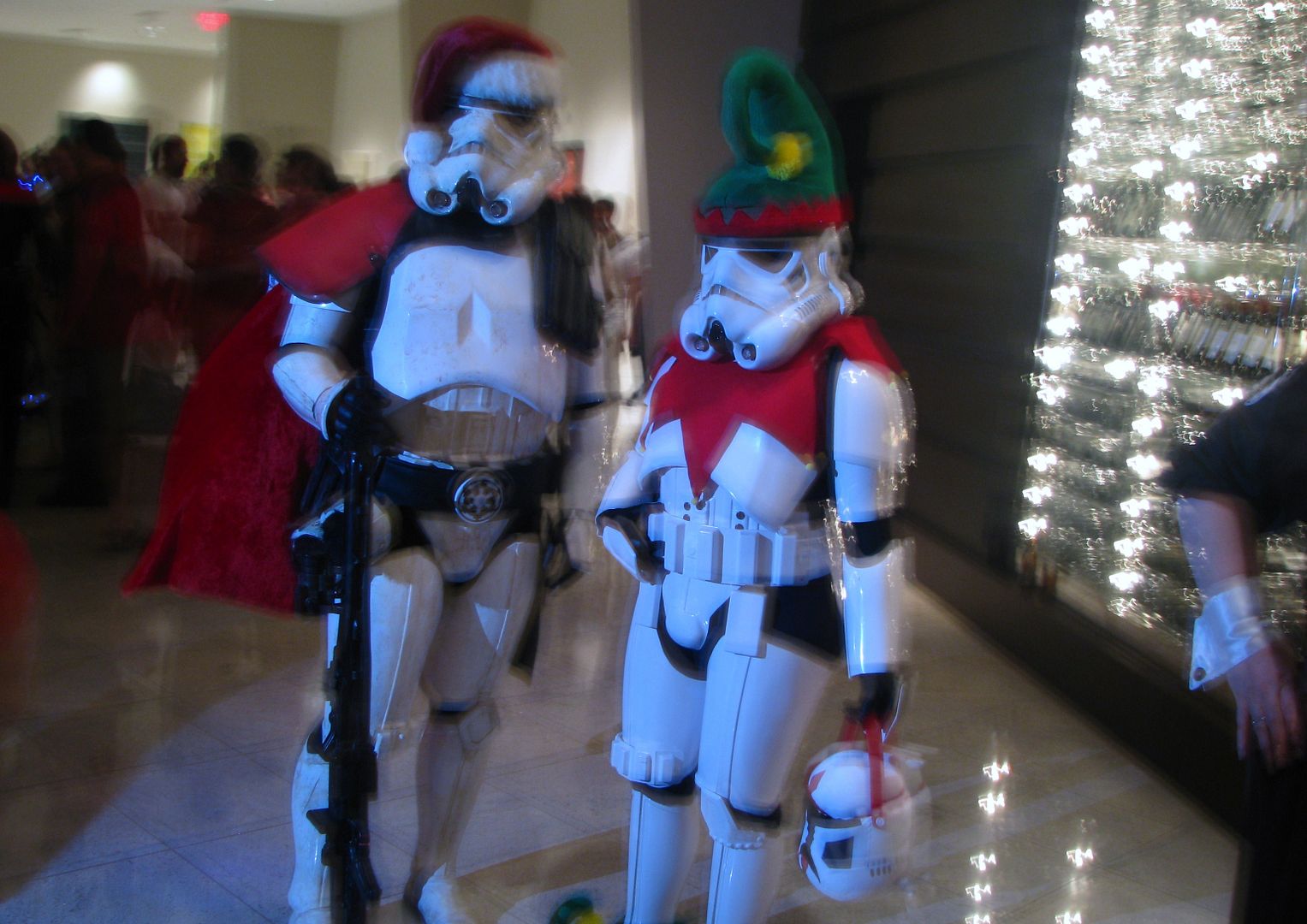
DAY 4
The final, and most poignant panel I covered was on gender disparities in science and engineering—something that this female-run science website has a direct and personal interest in. The conversation was a very interesting mix of both pedagogical approach and participation of women who choose to make science a career. The panel consisted of: Pamela Gay (who can be found at the blog StarStryder.com), Ginger Campbell (whose podcast directory can be found at Virginia Campbell, MD), and Kylie Sturgess (PodBlack Cat). Sturgess holds a master’s degree in gifted and talented education and is currently pursuing another master’s degree on paranormal beliefs. She has an R.A. position in university where she’s doing research for a study on mathematics and anxiety. Ginger Campbell hosts two podcasts on science topics. She’s noted that when she was in medical school, the number of women seemed low, but in retrospect, it’s a lot when compared to fields like engineering.
Sturgess began by citing the Trends in International Mathematics and Science Study (TIMSS) which showed that boys outperformed girls in each level in math in Australia—in contrast to internationally, where the performance was about even.
Campbell then provided a bit of information on Title IX, asking the audience how many thought it was so girls could play sports. Very few members of the well-educated audience raised their hands. She validated them and pointed out that in fact, Title IX stated that any university that gets federal funding cannot discriminate on the basis of gender, and that while it’s mostly associated with sports, those that originally fought for Title IX weren’t trying to get sports; they were trying to get women into law school, and medical school and traditionally all-male universities like Harvard and Yale. She mentioned a recent interview she’d done with Eve Marder who was among a seminal group of women that got to go to graduate school through a combination of Title IX and the lack of men going to graduate school after the deferrals for Vietnam stopped being offered.
Returning to the subject of statistics, Sturgess noted that parents’ values regarding math shape ability of a student. That is, parents who place a high value on the importance of math lead to students being able to do well in it. There was a note then that boys have a tendency to over-participate and that some of the traditionally “male” extracurricular activities, such as Dungeons & Dragons lead to enhanced statistical ability. Campbell wondered if that is similar to how young men spent so much time computing sports averages. Sturgess noted that these tendencies do increase how we see math—as do inaccurate perception of careers that need math and individualized and cooperative learning environments.
Pamela Gay arrived late to the panel by this point, and interjected by stating that there are two great lies we tell people: 1 – “Anyone can be anything.” In reality there are a lot of people who, for a variety of intellectual reasons, can’t be PhD microbiologists. 2 – “Because of social influence X you can never be such and such.” She went on to say that somewhere between those two lies, is the truth. As an example, she noted that at the current university where she teaches, there are lot of people from small towns. The only thing holding them back and differentiating them from the kids who go to the major universities is the lack of a good math teacher.
Sturgess compared the U.S. educational system with the systems in Europe and Great Britain—the international students begin specializing a lot earlier, and as a consequence, their undergraduate-level students are doing work on a level equivalent to master’s level work in the U.S. However, an advantage to the U.S. system is that there’s a great deal more freedom, and the community and state college system allows you to change your mind. She then provided the example of a student in Canada who decided, “I don’t want to be a pipefitter anymore!” and after enrolling in college went on to become a Hubble fellow.
There was then a discussion about the potential language bias on exams and how for example the change from a “box of books” falling to a “knitting ball” falling changes the way we view the question. This bias showed in 1994 when women of similar intellectual ability to men scored 50 pts lower on Physics SATII and 150 points lower on physics GRE.” Things like this do affect gender bias, as well as things like trying to have a family and gain tenure. Another small example of this type of bias in the employment field can be seen in the departments themselves, where there is a lot of heavy equipment and no carts anywhere.
The Women in Physics and Astronomy, 2005 report summarizes a lot of the trends related to women in physics and astronomy at different levels. Among the highlights that were identified: In 2003, women made up 18% of physics and 20% of astronomy departments over-all. But if you look at plots of degrees over time, this is changing. In particular, the number of Bachelor’s degrees has risen to 40% from 18%. Conversely, When you look at projections for women in all degree fields, the number of women who reach full professorship in physics asymptotically approaches 0. The result of this is that if every person at Caltech University who left their position was replaced with a woman, it would still take 20 years to reach a 50/50 gender proportion. In summary, gender equity isn’t going to happen, and has nothing to do with interest.
The panelists then addressed potential solutions to this issue. Among the suggestions: “What we should be looking at is not trying to get women aspiring to be PhDs in science, but how can we keep all kids interested in science?” Campbell commented about how the wonder of the universe is often lost at some point. [In many ways this comment reminded the correspondent of her college chemistry professor saying that children are natural born scientists who are always excited to learn and try to understand how the universe works.]
Gay said that it was truly shocking to her how few students have someone who believes in them and that take interest in their growth and development. She said she tries to approach teaching as getting students “doing science” instead of just “doing homework.” She then talked about kids coming home complaining of people who had been mean to them, and that there was a lack of someone to say, “I believe in you; be nice twice then swing back.” The audience laughed quite hard at that quip. Campbell said that thinking of teachers who believed in her it was not always math and science, that sometimes the message is more important than the discipline. She also said that she got into the sciences because they were harder to her than English, and she wanted the challenge. She asked, “When your kid says x is hard, why is that a bad thing?”
Audience questions:
There was a gentleman who wondered about the influence of “The Evil Empire of the past eight years” and whether the change in administration would change things. All panelists agreed it would and talked more directly about the influence of the “No Child Left Behind Act (NCLB),” and what a terrible thing it was that “learning” had been replaced with memorization. Gay noted that she could name all the kings and queens of England but could not tell you any more about them. She also stated that she could identify all the components of her computer but not necessarily what they did—that she felt the process of understanding had gotten lost somewhere in the fallout from NCLB and that is truly regrettable. She went on to say that children’s lives are being overly legislated as “soccer moms” haul children from one event to one lesson to one practice to the next, and that conversely inner-city children who are often left alone for long hours of the day [which she quickly noted is just as bad] have a much higher demonstrated ability to use their imaginations and participate in creative play—she said children should be free to get dirty, run around, and use sticks as swords.
This was followed up by an audience member who identified herself as an employee of the National Academies of Science (NAS). She noted that she chose a liberal arts path after her pre-calculus teacher told her there was no room for creativity in math, before building on the previous comment about federal messages regarding math and science. She’d said that one of the greatest points in her career at the Academies was President Obama’s address to the full assembly of members, and that it was really heartening to her and to many other people who watched the address with her to hear his message that the government’s “war on science is over” and moreover to hear him specifically encourage scientists to work with, inspire, and mentor young people. Based on that, she concluded, “I think we’re on the edge of a renaissance.” [in some coincidental timing, the NAS has just released are report today on Engineering Education in K-12.
The panelists were a bit more skeptical, saying that it’s good to get people excited but it doesn’t get them employed.
The next audience member was a mother who talked about her work volunteering at her children’s school. She wondered if whether in doing so much work to encourage girls to participate in science, boys were being left out.
Sturgess said that from what she’s seen, getting girls excited often does get boys excited. Gay noted that part of what you’re seeing is the difference between fields. While biology is now dominated by women, when you look at the physical sciences, engineering and physics are at 15% and 16%, respectively. She went on to say that while until 8th grade interest is equal in both fields that around middle school, a strange sociological “something” happens and girls dumb themselves down. She added that they also try to “go blonde” and qualified that while blonde isn’t necessarily dumb, the association is there.
During a discussion about the work environment, Gay said that she actually quit the science field for a while because she got tired of being asked, “Oh, whose secretary [are you]? Whose grad student [are you]?” She said even now in work that when she is “unprepared” student evaluations say she doesn’t know the material while when her male colleagues are unprepared, the student evaluations will say “unprepared.” Sturgess said that was very interesting, because in Australia studies have revealed that the gender of teachers is not as important as qualifications.
The final audience question referred back to the “leakage effect and pipeline effect” in science and technology and asked: How do you improve the approaches?
Campbell said that they really need to make more of an effort to have an old-girls’ network—that men have been helping each other all the time, and women need to accept help from other women without a chip on their shoulders. Gay advocated for more anonymity in the job application and peer review process. She noted that you don’t see reviewers’ names, so why should they see ours. She also noted that during the first cut of an application process (when one is only reviewing for achievements and qualifications), it should also be gender anonymous [as auditions at most symphony orchestras, historically underrepresented by women, have become].
Closing message of Dragon*Con 2009? Never believe what you read on T-Shirts bought at conventions, kids. It’s never lupus!
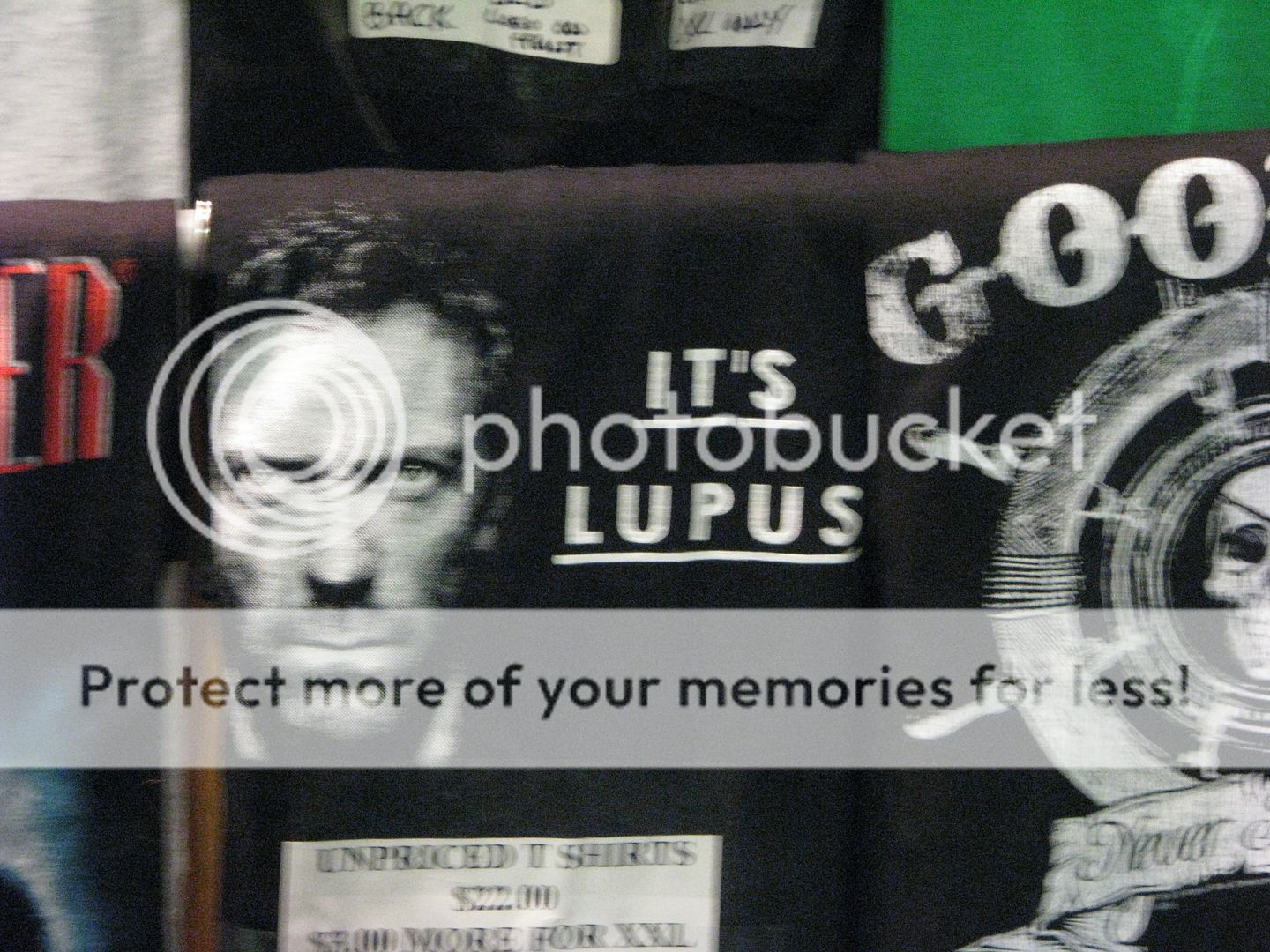
~*PoliSciPoli*~
*****************
Follow ScriptPhD.com on Twitter and our Facebook page. Subscribe to email post updates on our home page.




9:02 am on September 21st, 2009
Hello! I’m not from TIMMS – my site is at podblack.com. Thank you so much for such a thorough summary, I’m sorry I only just found it now! Barbara Drescher, who I urged to come to Dragon*Con, alerted me to this site.
Barbara Drescher, who I urged to come to Dragon*Con, alerted me to this site.